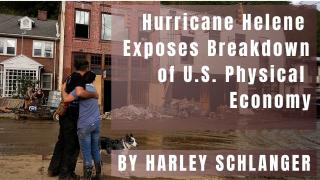by Harley Schlanger
Oct. 7 -- On September 27, a devastating storm, Hurricane Helene, hit the Florida Gulf Coast as a Category 4 hurricane. It quickly moved into Georgia, South Carolina, western North Carolina and Tennessee, dropping near-record amounts of rainfall, ranging from 15 inches to more than 30 inches of rain in one town. It hit very poor areas in the Appalachian/Blue Ridge Mountains, and an emergency was declared in the five states, as more than 3 million homes were without power, more than 220 people are known dead, and more than 1,000 are still missing.
Five days later, with the situation on the ground deteriorating, as aid was slow in arriving, Homeland Security Secretary Alejandro Mayorkas reported that the Federal Emergency Management Agency (FEMA) was running short of funds. "FEMA does not have enough funds," he said, "to make it through the season." This announcement was made as a new powerful storm, Hurricane Milton, was headed toward Tampa, Florida.
That this announcement coincided with an appropriation of $20 billion more in emergency funding to FEMA provoked a nasty partisan blame game -- not unexpected as the presidential election is now less than a month away. Republicans accused the Biden-Harris administration of prioritizing spending on wars and aiding immigrants rather than helping Americans, while Democrats accused Republicans of blocking funds for needed infrastructure. An additional issue raised is that available National Guard manpower is limited, as guardsmen in some of the affected states are serving overseas, supplementing regular U.S. forces, which are widely scattered due to commitments made as a "global policeman" to "defend the Unipolar Order."
According to House Speaker Johnson, he will not call Congress into session to allocate the appropriated funds until after the election. A followup statement from the Department of Homeland Security included an assurance that adequate funds are available to cover immediate relief efforts.
Both sides' claims as to whom is to blame have merit, but are missing the real point: The U.S. economy is operating below break even, and lacks the physical capability to address emergencies. Instead of investing government funds to upgrade infrastructure as a priority, delusional monetarist economic axioms favor schemes such as Public-Private Partnerships, giving wealthy constituents opportunities for private profit in a return to a feudalist mentality; or "Pay-as-you-Go" plans, where expenditures must be matched by reductions in other areas of spending, or recovered by user fees. Both of these models are a retreat from the Hamiltonian approach adopted during the George Washington administration, and applied by Presidents such a John Quincy Adams, Abraham Lincoln and Franklin Roosevelt. For these leaders, government investment in infrastructure was a necessary component of "internal improvements" which expanded the physical economy, as cheap and efficient sources of power, water management and transport generated improvements in productivity, which is a major source of real wealth production. The short term deficits in infrastrure spending are can be recovered by the increases in real wealth production, from productivity increases -- something which apparently no one in today's Congress understands.
Add to this foolish commitment, of applying "deficit reduction" schemes to infrastructure spending, the lunacy of Green regulations -- a major cause of the decline of the industrial base needed to upgrade the economy -- and one can expect more disasters to come.
Compare the response to Helene under the dysfunctional management of both parties with the efforts made by President Franklin Roosevelt (FDR) during flash flood events in 1937-38. After a week of little progress, the Biden administration deployed 6,700 emergency workers to supplement small National Guard units mobilized by the states. In contrast, Harry Hopkins, appointed flood relief commissioner by FDR, deployed 200,000 Work Progress Administration workers to aid in recovery in January 1937 flooding in the Ohio River Valley; and 100,000 WPA workers in September 1938 to place sand-bags to stem flooding, do dam repairs, and aid in evacuations in New England flooding, within 18 hours. ****
For FDR, such emergency aid, along with major infrastructure expenditures, was viewed as an essential part of recovery from the Depression. Today's officials refuse to acknowledge that inadequate relief funding and lack of skilled personnel, along with the collapse of aging infrastructure, are symptoms of the breakdown of the U.S. physical economy.
****For a more thorough report on the approach taken by Franklin Delano Roosevelt: FDR Knew How To Respond To a Monster Storm






